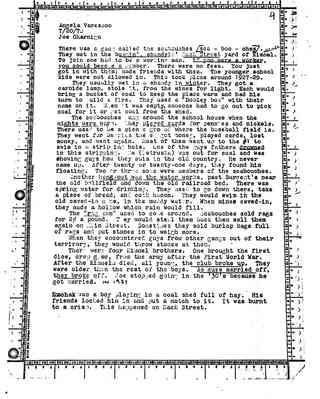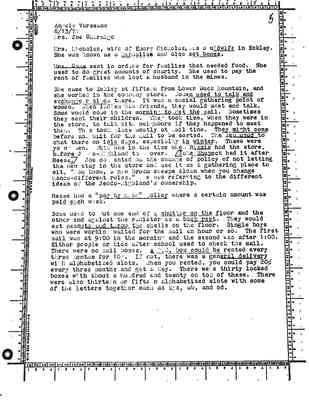Pages
page_0003
Angela Varesano 7/20/72 Joe Charnigo
Props made of pine and oak logs were used in the mines. Boards were shoved between the prop upright and the ceiling to keep the prop in place. Sometimes they were twenty inches in diameter to prop the ceiling up. Another was laid across the top of the prop to form the hoizontal beam.
In April 1917, he remembers the murder of one of his uncles by the other. These two brothers of his father just got home (on Shandy Street) from drinkijng at a bar in Hazlebrook called The Blue Pig. One got to arguing with the other over some money he owed him; the first brother wanted his money back. The other would not pay. The first brother, apparently having had too much to drink, went upstairs and shot the second brother in the throat, killing him. The murderer only spent six years in jail and then came back to work at Eckley.
Easter Monday, was known as duckin' day. As the mule drivers came home, they would get splashed by the women at the pump. Monday was men duckin' the women. Tuesday was women duckin' the men.
Men used to shovel the road open for the children to go to school. They would also shovel the road to the store so supplies could be reached. All the men worked at this shoveling. They shoveled the railroad trucks so cars could get through and coal mining could progress.
After I left Marshlick's, Mr. Charnigo called me over to his porch and said he remembered something else to tell me. Then he related the existence of "the love rock." This was a place used as a central meeting spot for friends and a place to stroll past in couples. It is down the road by Gera's house. It is a big rock which couples used to walk up and down by (in front of). They used to say to friends, "I"ll meet you at the love rock." They would sit on it in couples. Sunday afternoon strollers used to go by it in couples, going for chesnuts and huckleberries in the woods. They would also stroll up and down the road (Main Street).
page_0004
Angela Varesano 7/20/72 Joe Charnigo
School discipline was by paddle. If somebody in class did something wrong, the whole class would suffer because no one would "suck after" or squeal. There would be no recess for a couple of days. They also get paddles. You only got hit twice, but with the suction of the paddle, you wouldn't sit for a while.
Joe used to play the harmonica or mouth organ, as he calls it, while driving the mules. The mules got so used to hearing the mouth organ that they wouldn't go without the music. Songs he played included polkas, "My Blue Heaven," (which was his first harmonica song) "Down in the Valley," and "Down by the Old Mill Stream." He used a Horner "Marine Band" harmonica in the key of C.
Hucksters used to come through one at a time. While one was inside a house, they took the whole load of bananas, the whole stock, which was a couple dozen. They took them into the woods and got sick.
Emro Silvasi was the mean man. He had a canvas-covered wagon which was black with red wheels. The canvas could be rolled up on the sides and back. He would blow a horn; he had a scale cleaver, and chopping block. It was pulled by two horses. His mother would always buy her meat from him. She also brought from hackster, bayer, and grocery man.
To play nipsy a circle was made in the dirt and two and a half feet in diameter. Ten steps from the ring is a line. If the nipsy went into the ring, the batter was out and another player took their turn. If the nipsy landed on the line, the batter got one "crack" only. Any place outside of the ring, he got three hits.
A player put their foot on the circle and tried to make it to where the nipsy landed in the number of steps given by the batter. For example, the batter would say, "I'll give you six steps to make it to the nipsy." If he makes it, then he gets as many points as steps. If he doesn't make it, then the other player gets the points.
The night before Halloween they would go around tearing off gates, changing the board walk over the ditches. They left
page_0005
Angela Varesano 7/20/72 Joe Charnigo
(night before Halloween) the gates in the alley and up by the church where people used to find them and get them back. (He forgets what they used to call that night. ) "He just did it for devilment."
Men used to wear rings made out of a brass nut. These would be made by leaving one facet and filing off the rest. They used to put sulfur diamonds in these rings by drilling and filing a hole in the single nut facet and inserting a diamond cut to fit the hole. Clarence Drasher of Jupiter Street, Freeland, used to sell these for his uncle.
The McDermant housewas between Sulkasky/Banas's and Marshlick's. The foundation is left. Jimmy McDermant and family lived there in the early 1920's. John Evancho moved there from Back Street in the 1940's when Back Street people had to go. Paul Menchick was the last one. It was a double house like Sulkosky's. The above lived on the lower end toward downtown, and Matisaks lived on the upper end. Eva (Sulkosky) Matisak also lived there.
There used to be a club that met in the old school house up by Emil Gera's. This was before he remembers, however. He heard it had a pool table and the members were required to day dues. He doesn't remember the name.
The union was an important organization in town for the benefit of the miners. When they used to have elections, there was often a fight and state troopers had to be called in. This happened, for example, during the election of committeemen - the ones who would see the boss in case of workmen's complaints.
page_0006
Angela Varesano 7/20/72 Joe Charnigo
There was a gang called the scabouches [sca - boo - ches]. They met in the bummin', shandyin' Back Street yard of Kimnel. To join one had to be a working man. If you were a worker, you could become a member. There were no fees. You just got in with them; made friends with them. The younger school kids were not allowed in. This took place around 1927-29.
They usually met in a shandy in winter. They got a carbide lamp, stole it, from the mines for light. Each would bring a bucket of coal to keep the place warm and had his turn to build a fire. They used a "Dooley box" with their name on it. When it was empty, someone had to go out to pick coal for it or get coal from the shed.
The scabouches hung around the school house when the nights were warm. They played cards for pennies and nickels. There used to be a picnic ground where the baseball field is. They went for berries there, got money, played cards, lost money, and went again. Most of them went up to the #1 to swim in a stripping hole. One of the guys fathers drowned in this stripping. He (Petruska) was out for coal and was showing guys how they swim in the old country. He never came up. After twenty or twenty-one days, they found him floating. Two or three sons were members of the scabouches.
Another hang-out was the water works, past Surgent's near the old ballfield and down the old railroad bed. There was spring water for drinking. They used to go down there, take a piece of bread, and cook bacon. They would swim in the old caved-in mine, in the muddy water. When mines caved-in, they made a hollow which rain would fill.
The "rag man" used to come around. Scabouches sold rags for 2 cents a pound. They would steal them back then sell them again on Main Street. Sometimes they sold burlap bags full of rags and put stones in to weigh more.
When they encountered guys from other gangs out of their territory, they would throw stones at them.
There were four Kimnel brothers. One brought the first dice, crap game, from the army after the First World War. After the Kimnels died, all young, the club broke up. They were older than the rest of the boys. As guys married off, they broke off. Joe stopped going in the '30's because he got married in 1937.
Koschak was a boy playing in a coal shed full of hay. His friends locked him in and put a match a match to it. It was burnt to a crisp. This happened on Back Street.
page_0007
Angela Varesano 6/13/72 Mrs. Joe Charnigo
Mrs. Nicholas, wife of Emory Nicholas, was a midwife in Eckley. She was known as a herbalist and also set bones.
Mrs. Coxe sent in orders for families that needed food. She used to do great amounts of charity. She used to pay the rent of families who lost a husband in the mines.
She came to Eckley at fifteen from Lower Buck Mountain, and she worked in the company store. Women used to talk and exchange recipes there. It was a social gathering point of women. When ladies saw friends, they would meet and talk. Some would come in the morning to get the mail. Sometimes they sent their children. They took time, when they were in the store, to talk with neighbors if they happened to meet them. This took place mostly at mail time. They might come before and wait for the mail to be sorted. The men used to chat there on idle days, especially in winter. These were young men. This was in the time when Reesie had the store, before Jeddo-Highland took over. [Jack Shupeck had it after Reese.] Joe consented on the change of policy of not letting the men stay in the store and use it as a gathering place to sit, "You know, a new broom sweeps clean when you change hands-different rules." She was referring to the different ideas of the Jeddo-Highland's ownership.
Reese had a "pay by nine" policy where a certain amount was paid each week.
Some used to put one end of a shutter on the floor and the other against the radiator as a back rest. They would eat peanuts and throw the shells on the floor. Single boys who were working waited for the mail an hour or so. The first mail was brought at 9:00 in the morning and the second was after 1:00. Either people or kids after school used to check the mail. There were no mail boxes. A P.O. box could be rented every three months for 10 cents. If not, there was a general delivery with alphabitized slots. When you rented, you could pay 20 cents every three months and get a key. There were thirty locked boxes with about a hundred and twenty on top of these. There were also thirteen or fifteen alphabitized slots with some of the letters together such as xyz, ab, and cd.




